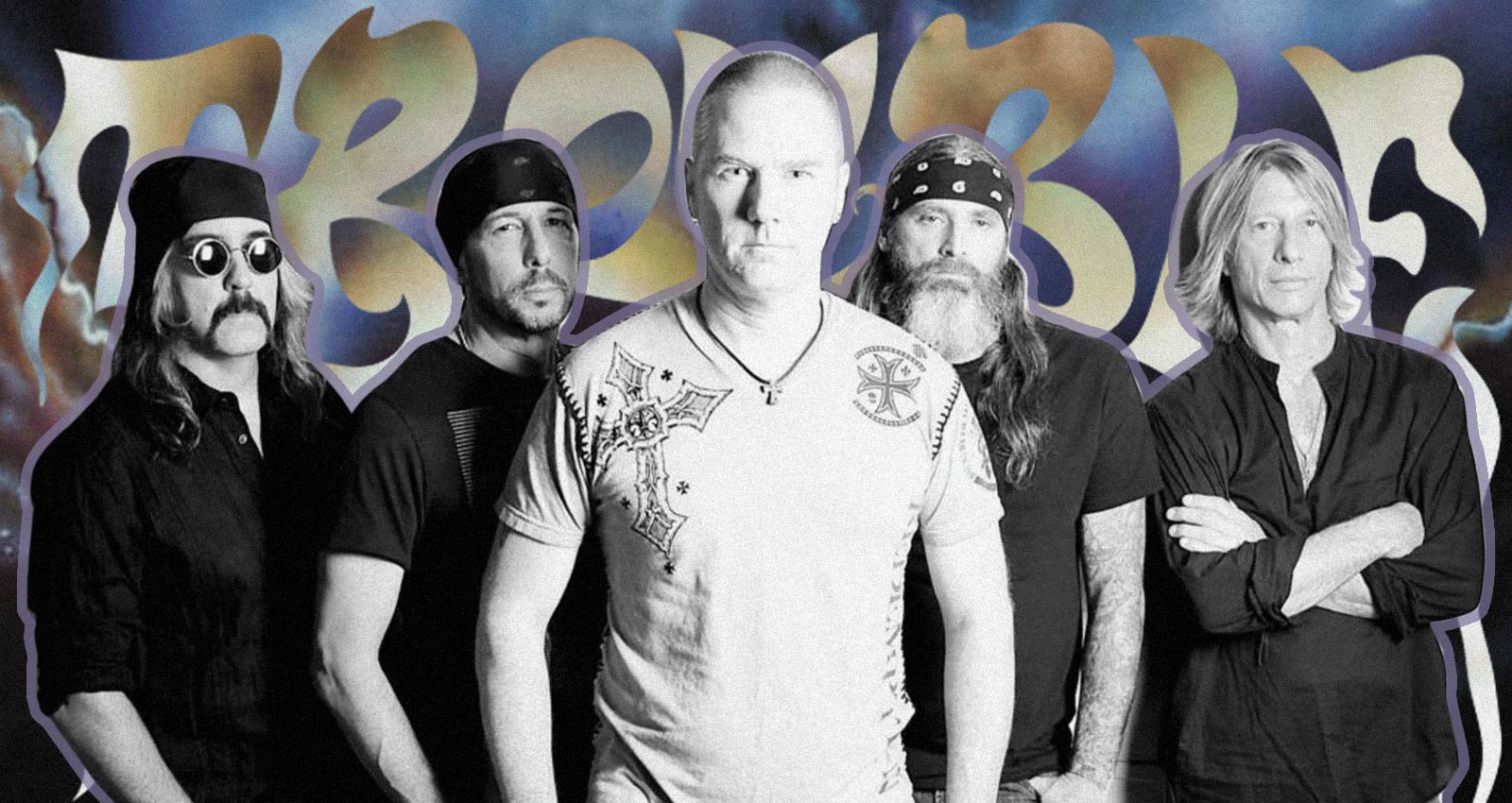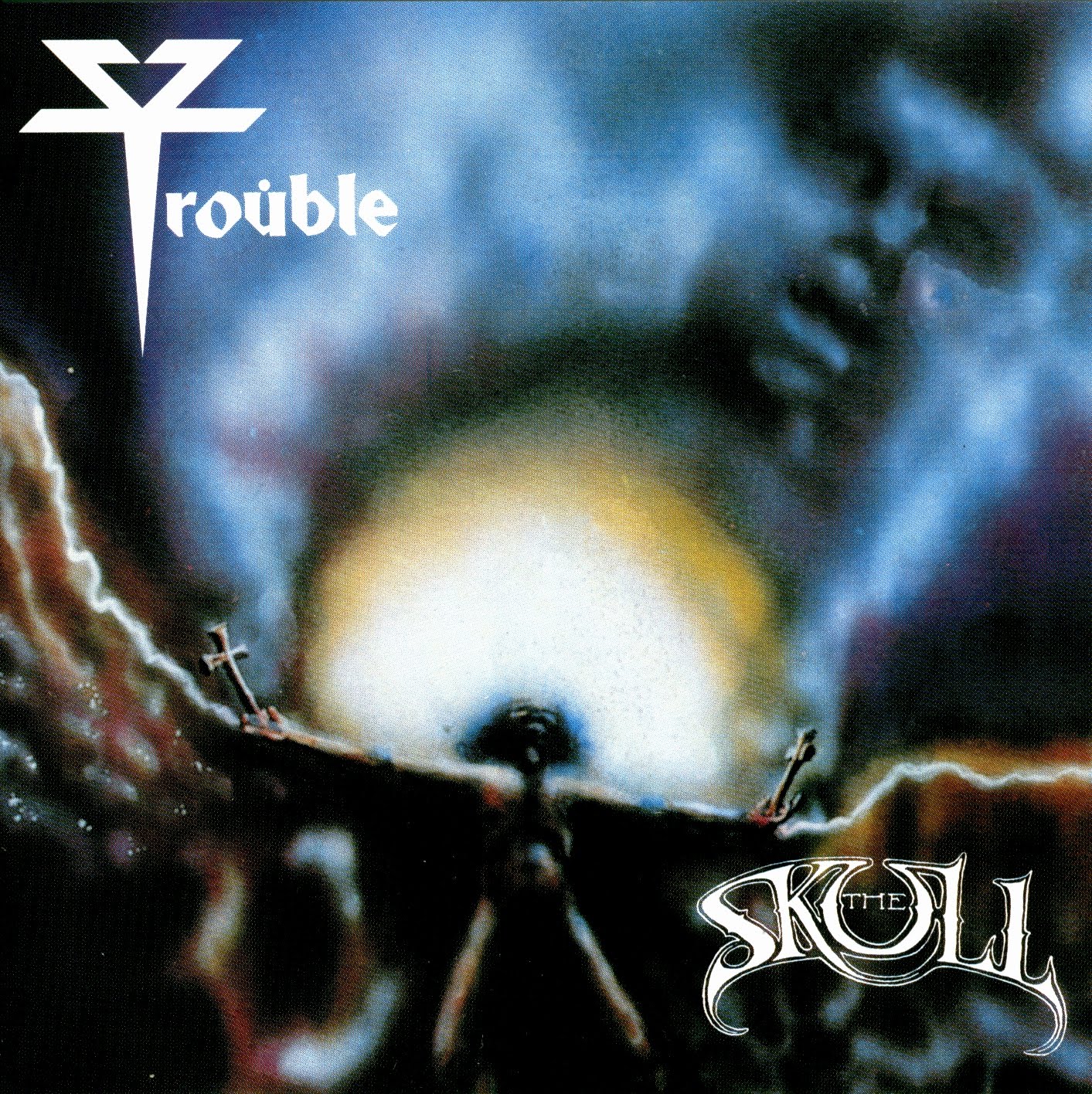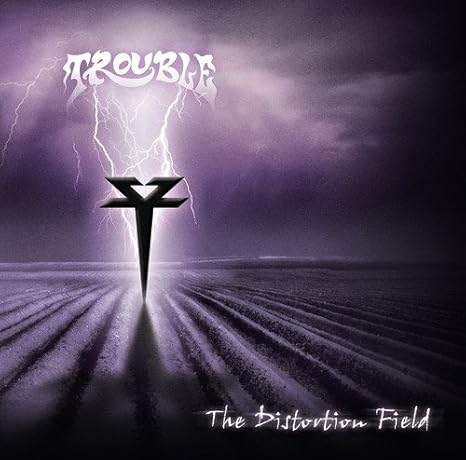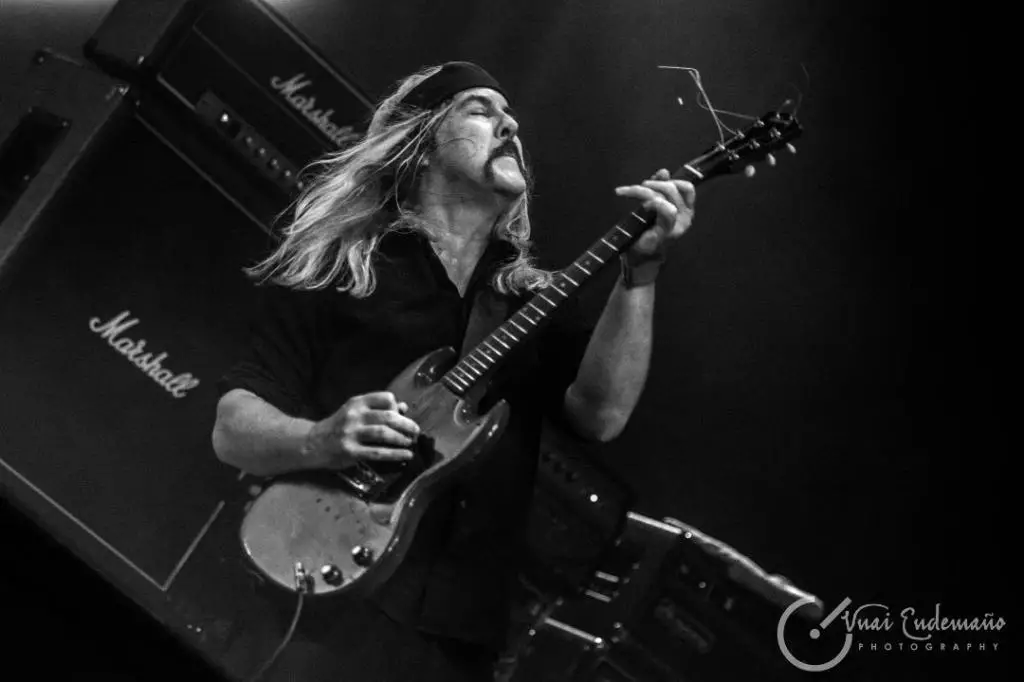All images courtesy of Space Loft Six Media

When we talk about bands that influenced entire genres, let alone sub-genres, it’s easy to get caught up in hyperbole. With that being said, when I say that Trouble is one of the most influential Metal bands to ever take the stage — I mean it.
Trouble as a band and Bruce Franklin (whom I’ve got with us today) as a guitar player have been instrumental in the development of Sludge, Stoner, and Doom Metal. Without Trouble, these genres simply would not exist in the way they do today. Albums such as Trouble (Psalm 9), The Skull, Run To Light, Manic Frustration, and Plastic Green Head truly transcend and predate the genre.
If you would like to learn more about the music of Trouble, head over to their Bandcamp here, or the band’s website here, and dig in. It is truly a pleasure to have founding member and guitarist of Trouble, Bruce Franklin with us today. Bruce is a great guy, and I really enjoyed getting to know him better. Enjoy this one. I know I did.
Andrew:
Bruce, thank you for taking the time to speak with us. This last year has been rough, right? How are you holding up during this seemingly ever-raging dumpster fire?
Bruce:
I’m not going to lie, it’s been a rough year. I am 59 years old and can honestly say that this has been the worst year of my life. I have been blessed enough to make it through, although the dumpster fire is still burning and it stinks.
Andrew:
Tell us about your backstory. What was your musical gateway so to speak?
Bruce:
I was interested in music at a young age. After having a kind of toy drum set for a few months, my parents decided that the guitar would be a quieter instrument. (Little did they know, a Marshall stack would be in my future). I started taking lessons at 8 years old for a couple of years. About the time I was really getting into Rock music, I ended lessons and started teaching myself by listening to Zeppelin, Sabbath, and a lot of Deep Purple. I was completely hooked then.
Andrew:
As a band, who are some of your earliest and most important influences? How did the group develop its signature style?
Bruce:
When Eric and I joined Rick’s band, with a couple of other guys, the common bond was 70’s Heavy Rock. We were doing covers of Black Sabbath, Judas Priest, UFO, Thin Lizzy, Scorpions, Blizzard of Ozz, and this was at a time when New Wave was the trend in the U.S. Eventually we started writing originals and we wanted to really rely on Black Sabbath and Judas Priest as the main influences for what we wanted to do. I always wanted to follow in Sabbath’s footsteps, but also employ the dual guitar approach of Judas Priest. At some point, we found our natural style and sound. That grew and matured as we grew and matured as a band.

Andrew:
Trouble is considered one of the pioneers of Doom Metal and later on, Stoner Rock. The style is so distinct, and along with a couple of other bands, you guys were the first to really do it. Looking back, what are your feelings regarding basically launching an entire subgenre of Metal?
Bruce:
Well, we didn’t have the foresight of this for sure. In fact, other than Witchfinder General before and St. Vitus, right after us, no one was really playing slow and heavy. We heard from a couple of labels that we were too slow since Thrash was starting to catch on with Metallica and Anthrax. Somehow, the couple of us that were doing the Doom Metal approach became an influence and bands like Candlemass and later Cathedral. Of course, it has grown a lot through the years and it really is rooted in the first and the best, which is Black Sabbath.
Andrew:
In the 80s we saw the era of Satanic Panic and a lot of extreme reactions to Metal music. Your label at the time, Metal Blade Records, marketed you as “White Metal.” What were the band’s feelings regarding that label? What was it like being a Metal band during that era? How was the reaction?
Bruce:
Well actually, even though some bands like Venom and Mercyful Fate were around, we didn’t really get slammed by other bands or fans for our lyrics then. Things weren’t so divided by genres as it is now. Years later, some extreme people that take themselves way too seriously, would hold our lyrics against us. Black Sabbath wrote lyrics like, “Tomorrow’s Dream,” “Lord of This World,” and “After Forever,” and nobody ever criticizes them for it. Trouble has done multiple shows with Slayer and whole tours opening for King Diamond and Danzig. We always held our own. As for the White Metal tag by Metal Blade, I think Brian Slagel saw it as a marketing tool to help distinguish us as unique. We never called ourselves White Metal that I can remember.
Andrew:
Your first two albums, Trouble (Psalm 9) and The Skull are true classics of the genre. They were such influential albums, were harbingers of what was to come, and really set the genre in motion. Looking back, what do you recall about the recording of those records? In your opinion, have they held up?
Bruce:
What I recall most was going out to L.A. to record both of those albums. We had a good working relationship with Bill Metoyer engineering. No big secrets. We just went in and played like a live band and then did overdubs. I do remember that we were running out of booked studio time on The Skull album. We had to mix the whole album in about 8 hours after already spending the day recording vocals. We went all night until about 4 am. I think there are some things, like way too much reverb, that really make those albums sound dated. The songs and guitar sound still hold up, but the reverb on drums, vocals, and even guitar solos, sound very 80’s.

Andrew:
One of my favorite albums by Trouble is Green Plastic Head. It’s so heavy and really sticks out in stark contrast to a lot of the Grunge and Alternative music that was popular at the time. Tell us more about the recording and history of that album.
Bruce:
We recorded that at Indigo Ranch studios, which was on the top of a mountain above Malibu. We had recorded the previous album, Manic Frustration there also. As with any album, except possibly Manic Frustration, we just wrote the music and whatever came out, came out. No preconceived decisions about styles of songs. We pretty much have always just been ourselves and haven’t really worried about what was trending in music. We didn’t have a producer trying to steer us in a direction, so there are multiple styles on the record. Classic Metal, Doom Metal, Stoner Rock, and Psychedelic Rock.
Andrew:
One of the things that amaze me regarding Trouble is you’ve been on two legacy labels in Metal Blade and Def American, and have influenced nearly every heavy band that has come after you have been a cornerstone of both the Doom and Stoner Rock genres, but you’ve never achieved major commercial success as some others have. Why do you feel that’s been the case?
Bruce:
There are probably a number of reasons. One is that we never had good management that understood the band. During the Metal Blade years, we didn’t have any management. Then in the Definitely American years, we had a pro manager, but he never really understood us. He was trying to turn us into a more commercial pretty boy band, which was not us. Another reason is that we were never very Metal looking. We looked more like a 70s hippie Hard Rock band. Later, when the Stoner Rock explosion happened, this would be a popular look, but at the peak of our career, the stoner/hippie look was not the trend. With any band, there also has to be luck involved. There have been plenty of stories of great and talented bands that just didn’t make it big, while there have been plenty of mediocre bands that had
large success, even if for a short time.
Andrew:
Your most recent record was The Distortion Field. With all this downtime we’re experiencing, can we hope for the long-awaited new album from Trouble anytime soon?
Bruce:
We were basically slated to start recording a new album last spring/summer, but COVID put a halt to that. We are looking to get back to rehearsing and then recording during this current year in order to have a release for 2022.

Andrew:
The band’s work has evolved so much over the years, but Trouble’s delivery and style still shine through. What would you say the through-line is which overarches the band’s work?
Bruce:
It’s hard to really say other than just being ourselves. We don’t try to write a certain way really, it is just what naturally comes out of us. I think this is why each album sounds somewhat different. That recognizable guitar sound is usually something you can count on though.
Andrew:
Let’s talk about the state of the music industry a bit. What are a few things you would like to see change for the betterment of both the fans and artists alike?
Bruce:
Boy, that is tough, because the industry for Rock and Metal is barely alive in America. It’s better in Europe, but I just don’t see much of a future financially for the music business. For the last 15 years, the only way bands were making money was through touring and merchandise. Now we are just about at 1 year and still counting where bands can’t make money doing the only thing that would make them money. Luckily, most of us in Trouble chose to not depend on only a music career to support ourselves by the later 90s. As fans are concerned, what could be better? They can find their favorite band’s music on the Internet for free or for very cheap. Concerts are more expensive, but that is in some way, to try and balance not getting compensated for recorded music. Let’s just hope what’s going on now hasn’t killed live music. There will be a number of venues that have gone out of business after a year or more of no revenue.
Andrew:
In a world dominated by late-stage capitalism and social media, can indie artists really, truly get ahead? How do we keep the playing field level so that everyone has a chance to succeed?
Bruce:
Everyone has never had an equal chance to succeed. There has always been luck involved in a band breaking. No one is going to make a lot of money anymore anyway. About the best any newer band can hope for is to make a bit of money doing what they love, but my suggestion would be, don’t quit your day job.

Andrew:
Are you into records? Tapes? CDs? Digital? Where do you like to shop for music?
Bruce:
I own about 750 vinyl albums and about 120 CDs. A few, maybe 20 cassettes left from the 80s/90s. I don’t buy much new music anymore. Mostly shop at used record stores.
Andrew:
What are a few albums that mean the most to you, and why?
Bruce:
Well, The Monkees helped get me started when I was 6 years old. The Crazy World of Arthur Brown is an all-time favorite album, even though there isn’t any guitar on it. Dark, creepy, and totally original. Deep Purple’s Made In Japan was a huge record for me in my formative rock years. Black Sabbath’s first album changed my life and then Master of Reality was the sound that seduced me. Judas Priest’s Sad Wings of Destiny was probably the next game-changer for me. KISS Alive! was also a benchmark, but that is one that hasn’t remained as important as it was at the time. There are many albums that I love, but those are probably some of the milestones.
Andrew:
Who are some of your favorite artists? Ones that mean the most to you.
Bruce:
The original Black Sabbath means a lot to me. I never heard another band that quite touched a nerve the way Black Sabbath with Ozzy did. A guy by the name of Larry Norman, who was one of the first Christian Rock guys, means a lot to me. He was a rebel and an unbelievable songwriter who was admired by people like Paul McCartney, Paul Simon, and Pete Townsend. Alice Cooper was another favorite of mine from an early age and while he had a few years in the early 80s that were not good, he eventually carried on making pretty great music and lyrics up to the present. He feels like someone I know, an old friend. Some of my favorite guitarists are Ritchie Blackmore, Tony Iommi, Uli Roth, and David Gilmour. I really enjoy the Hammond organ also, and Jon Lord, Vincent Crane, and Keith Emerson are favorites.
Andrew:
Last question. You’ve maintained a strong DIY approach throughout your career, which is awesome. That said, what advice would you have for young artists just starting out? How do bands stay afloat in a world that seems to be so abhorrent to creatives?
Bruce:
Well, there are no record labels handing out bunches of money anymore, so labels also don’t have the influence on a band’s music that they once had. The way to stay afloat nowadays is to not give up your day job. Even if you get some success, it will not sustain you for long. As long as a band is good at making their own creative music, there will be a label interested in releasing it. There are so many indie labels that are just into being part of the music scene and helping further bands that they believe in. Nobody will get rich, but being able to do what you love and get compensated for it is rewarding. That affords bands to tour and sell merchandise, which hopefully is something that will return. If you plan realistically, you can reap some emotional, and hopefully financial rewards too.
:format(jpeg):mode_rgb():quality(90)/discogs-images/R-403870-1571849186-4688.jpeg.jpg)
Interested in diving deeper into the work of Trouble? Check out the link below:
Be sure to check out the full archives of VWMusic Interviews, by Andrew Daly, here: www.vwmusicrocks.com/interview





Leave a Reply